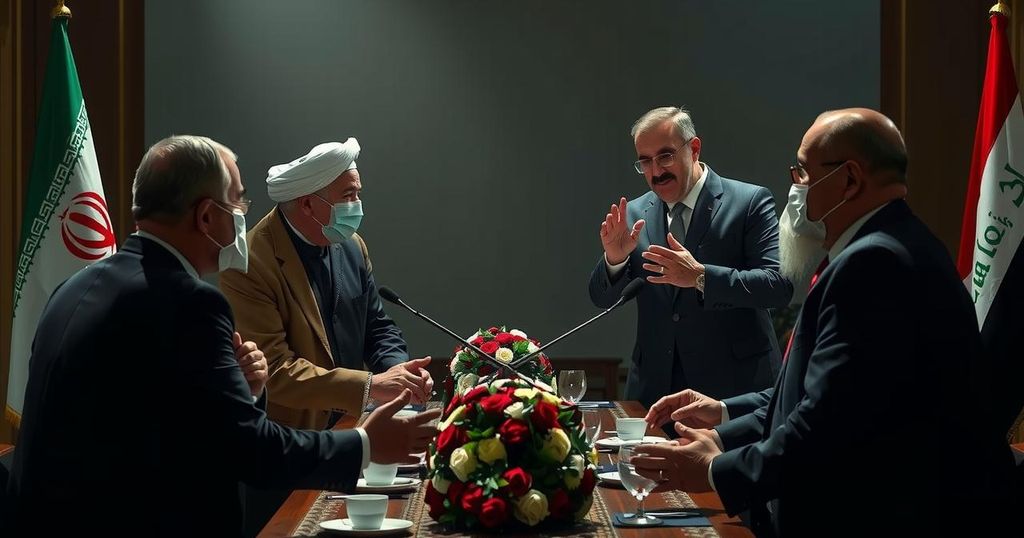Global news
“ AL - ARAJI, “ KHAJI, ABBAS ARAGHCHI, AL - ARAJI, ALI ASGHAR KHAJI, ARAGHCHI, ARAJI, AS, ASIA, ASTANA, DIPLOMACY, EUROPE/ASIA, HEZBOLLAH, IRAN, IRANIAN FM, IRGC, IRNA, ISMAIL QAANI, ISRAEL, KAZAKHSTAN, KHAJI, MIDDLE EAST, MIDDLE EAST AFFAIRS, MINISTRY OF DEFENSE, MUSTAFA YURDAKUL, PE, PEZESHKIAN, QASIM AL - ARAJI, TURKEY
Isaac Bennett
0 Comments
Iran’s Diplomatic Outreach in Iraq: Strengthening Security Cooperation
Iran’s Foreign Minister Abbas Araghchi met with Iraq’s National Security Advisor Qasim al-Araji to enhance security cooperation amid rising tensions in the region. These discussions follow the Quds Force’s involvement in Iraqi affairs and are part of Iran’s broader strategy to bolster influence via diplomatic channels, particularly in light of Israeli actions. Simultaneously, talks on security issues in Syria were held in Astana, underscoring Iran’s interconnected regional interests.
On a recent Sunday, Iran’s Foreign Minister Abbas Araghchi engaged in discussions with Iraq’s National Security Advisor Qasim al-Araji in Tehran, following a notable meeting between Ismail Qaani, the head of the Quds Force, and Araji. This sequence of diplomatic engagements highlights Iran’s objective to consolidate its influence in Iraq, employing both the Iranian Revolutionary Guard Corps (IRGC) and diplomatic efforts. As the Arab League and Islamic summits transpired in Saudi Arabia, these meetings coincided with declarations from Iraqi militias regarding drone strikes aimed at Israel, underscoring a climate of escalating tensions in the region. During their meeting, Araghchi emphasized the significance of security cooperation between Iran and Iraq, asserting that enhancing this collaboration would bolster both security and economic relations. Araghchi stated, “We consider Iraq’s security as Iran’s security and we hope that with the full implementation of the security agreement, sustainable security would be established in the border areas of the two countries.” The officials discussed bilateral agreements, particularly following Iranian President Pezeshkian’s recent visit to Iraq. Both nations have publicly reaffirmed their commitment to security collaboration, with Iraq’s leadership echoing this sentiment, stating that Iraq views Iran’s security as indistinguishable from its own. Additionally, Ali Asghar Khaji, an advisor to Araghchi, partook in discussions in Astana, Kazakhstan, focused on the ongoing situation in Syria. In Astana, Iran raised concerns about Israel’s alleged expansionist ambitions in the region, participating in the 22nd round of talks aimed at addressing the Syrian conflict. Khaji also met with Turkish and Russian officials to discuss cooperative efforts and security issues in Syria, with calls for Israel to cease its aerial assaults. Furthermore, as Iranian diplomatic efforts expand, the foreign minister highlighted the importance of Iran’s relations with Pakistan and the establishment of contacts with Lebanon. Encouraging remarks were made regarding the successes of Hezbollah in facing challenges from Israeli actions, with Iranian representatives examining the security dynamics in West Asia for further stability enhancements.
The geopolitical landscape in the Middle East is marked by Iran’s complex relationships with its neighboring countries, particularly Iraq. Iran wields considerable influence in Iraq through various Iranian-backed militias and political strategies, aiming to enhance bilateral relations and security cooperation. The backdrop of regional summits, military escalations involving Israel, and Iran’s support for resistance movements like Hezbollah further complicate the stability of the area, influencing diplomatic conversations and security strategies.
In conclusion, the recent meetings between Iranian officials and Iraqi leaders illustrate Iran’s strategic intent to deepen its influence in Iraq through both military and diplomatic channels. The emphasis on security cooperation highlights a shared perception of mutual threats, especially concerning Israel, while discussions in Astana reaffirm Iran’s regional stance against perceived aggressions. Overall, these developments indicate a concerted effort by Iran to solidify its regional presence amidst complex geopolitical dynamics.
Original Source: www.jpost.com




Post Comment